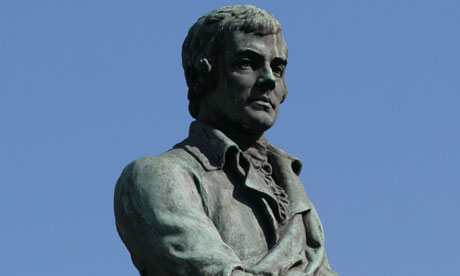Original versions of two poems, as well as letter from poet's beloved 'Clarinda'

Robert Burns statue in Leith. Photograph:
Jason Baxter/Alamy
Three long-lost manuscripts
by Robert Burns – as well as
correspondence between the beloved Scottish author and his friends – have been
discovered by a researcher in what is being described as one of the most
important Burns discoveries in years.
One of the texts is a letter
from "Clarinda", the pen name taken by the woman Burns loved, Agnes McLehose,
following the poet's death. Clarinda, who in life Burns had addressed variously
in his poems as the "mistress of my soul" and
"Queen of
Poetesses", was writing to Burns's friend and doctor William Maxwell, three
months after his death in 1796. Maxwell had been at Burns's side when he died,
and after asking for the return of the intimate letters she had written to Burns
– whom she knew as "Sylvander" – she also wrote in a postscript that "an account
of our late friend's final scene, if it is not too bold to ask for, would be
considered a singular favour".
"It's right at the end of a very businesslike letter, as though she couldn't help herself," said Chris Rollie, the researcher who discovered the manuscripts. Rollie was contacted by an old friend about the material, but originally dismissed her belief that she had stumbled across something important inside an Extra Illustrated W Scott Douglas edition of The Works of Robert Burns, dating from 1877-79, which belonged to Burns's publisher, William Paterson.
"I get quite a few calls like this, and I tried to let her down gently," he said. "But she said she still thought I should have a look. Within 15 minutes of looking at them I could see there was some very important and original material."
Also unearthed were a
handwritten manuscript by Burns himself of the song "Phillis the fair", with
minor textual variations, a pencil manuscript by Burns of an early draft of "Ode
to a Woodlark", lost since 1877-1879, and a handwritten letter from Burns "to
Robert Muir, Kilmarnock". The treasure trove also contained a letter from
Clarinda to Burns, dated 2 August 1791 and containing for the first time her
complete poetic response to Burns's poem "On Sensibility".
"'The finding of the
Clarinda letter in full is very timely as we move towards a new edition of
Burns's correspondence, and the other new manuscript findings of letters will
also similarly help," said Professor Gerry Carruthers, co-director of the University
of Glasgow's Centre for Robert Burns Studies, which is hosting a Burns
conference on 12 January where the findings will be presented in full. "It is
very exciting that such lost manuscript material continues to emerge in the 21st
century."
The manuscripts have now been sold to a collector.
No comments:
Post a Comment